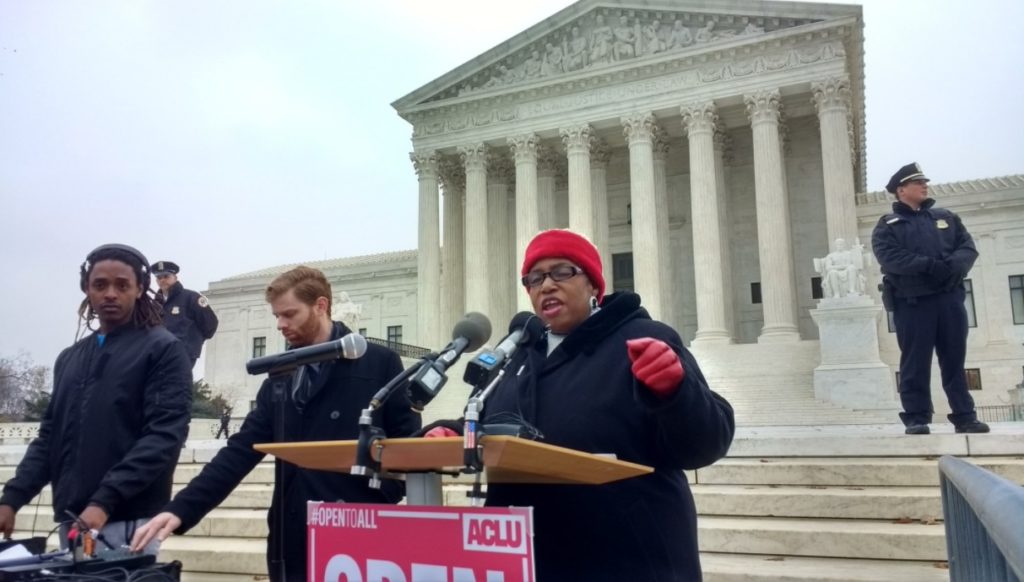On December 5, 2017, I, an African American lesbian elder, found myself on the steps of the Supreme Court of the United States of America. I had been asked to share my thoughts on the Masterpiece Cakeshop v. Colorado Civil Rights Commission case. I was happy that I’d been asked because I had a few thoughts and life experiences on what legalized discrimination looked and felt like.
However, for a few minutes, being in front of the Supreme Court, the highest court in the land, seemed surreal. Sort of like the time my wife and I took a cruise down the Nile in Egypt with the pyramids as a backdrop. I mean here I was on the same steps where on May 17, 1954, former Justice Thurgood Marshall of the NAACP stood and presented the Oliver Brown et al. v. The Board of Education of Topeka, Kansas and WON — thereby turning legalized racism under the guise of separate but equal on its head. It was here that in 1971, the Justices relied on a brief written by the now Justice Ruth Bader Ginsberg, to rule that the Equal Protection Clause of the Fourteenth Amendment prohibited differential treatment based on sex. And on June 26, 2015, the Supreme Court decided that all states are required to issue marriage licenses to same-sex couples and are required to recognize same-sex marriages validly performed in other states. All of these cases have had a tremendous and profound impact on the quality of my life and the lives of my family and friends.

And there I was, Brady and Mary’s daughter, on the steps of the Supreme Court, to lift my voice regarding the inequity, bigotry and resulting consequences to LGBTQ/SGL elders if this law passes. I’d like to share my remarks with you from that day:
Hello, before I start my remarks, I’d like us to look at what is written on the arch of the Supreme Court: “EQUAL JUSTICE UNDER LAW.” And it is being held up by strong pillars.
Hi. I’m Imani Woody. And I’m a daughter, sister, mother, grandmother and an elder lesbian of African descent. This case is a personal one to me, because we all know that it goes beyond cake and wedding planners. My ability to go to a restaurant, catch a cab, go to the doctor, or even just go to the movies with my wife are threatened if people can use their religion as a license to discriminate.
In the 60s, people used race to discriminate against my family and not allow my mother, who was deathly ill, to be treated at a hospital that was nearer. Because of this discrimination, my father drove us, his five children and his wife, to a hospital that accepted colored people. However, it was too late to save my mother — she died that night. I was 10, the oldest of five children.
And when my brother died of complications associated with AIDS, the funeral home refused to pick up his body from the hospital. This was after my father had pre-paid funeral arrangements. My father, a minister, and my family were devastated.
So I know firsthand the havoc discrimination can cause on families and individuals. No matter who you are — you and me, and everyone here today — has a right to equal treatment under the law.
Many LGBT older adults are not as lucky as I am. I am fortunate to have a wife and family. And I have a home. But many LGBT elders can’t be here today on the steps of the Supreme Court. So many of us don’t have family to rely on; we can’t get to the grocery store, can’t get a meal, and can’t get to the doctor without the assistance of paid businesses. Unfortunately, many of the people and organizations we rely on as we get older are religiously affiliated.
I don’t know about you, but I know I don’t want to live my life – and I know I can’t live my life – in a world where I never know if my next meal or my next visit to the doctor might be stopped in its tracks because someone wants to use their religion as a license to discriminate against me: because I’m a woman, because I’m Black, or because I’m a lesbian.
The Constitution does not give landlords, senior centers, nursing homes, or hospitals the right to put a sign outside that says “straight people only.”
That’s not my country. And I know that most of us don’t want to live in an America like that either.
By being here today, I’m giving voice to other LGBTQ/SGL elders who share their plight and can’t be here today.
And I’m asking the Supreme Court to do the right thing and not turn the clock back to the time of earlier legal discrimination, where children lost their mother, a father lost consideration for a burial, and where people lose their quality of life because discrimination is again legalized.
Dear Justices, do the right thing. Thank you.
The crowd started chanting, “Do the right thing! Do the right thing!” As my wife and I made our way out from the crowd, we pulled closer together, a bit nervous as we had to pass the zealots and supporters of Jack, the bakery owner, carrying signs and having their own rally. It saddened me to know that other citizens saw this passing of this law as valid and as a moral victory. I said a small prayer for them and for us.
And for the Supreme Court – to do the right thing!
The opinions expressed in this article are those of the author and do not necessarily reflect those of the Diverse Elders Coalition.

